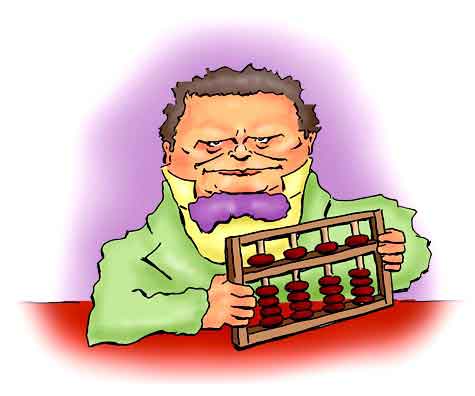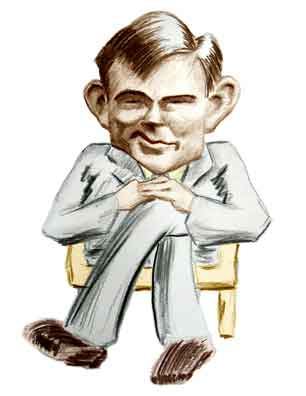Charles Babbage
Invented, Not Made
Quoted, Not Said

Charles Babbage
No, Charles Babbage did not make the first real computer.
He did, though, invent it.
Ha? (To quote Shakespeare.) You mean you can invent something and not make something?
Yep, that's what we mean.
Well, we'd really like to know how you can do that.
I thought you would as Captain Mephisto said to Sidney Brand. It's very simple really.
You see, inventing something new does not mean that you must physically create something. You simply have to conceive an idea which is new, novel, and (supposedly) useful. Do that and and hey, presto!, you are an inventor.
True, it helps to convince both a patent agent and a patent examiner that the invention will work. That way you can get a patent as well. But you can be an inventor without getting a patent.
So despite what you may have read, you do not need to construct a physical working model to be an inventor - or get a patent. The patent office routinely accepts nothing more than diagrams or a written description of the invention.
Well, that's fine. But surely the inventors did make the device in his laboratory or workshop, didn't they? And so - quote - "reduced the invention to practice" - unquote. Even if they didn't provide the working model to the patent office itself.
Weeeeelllllllll, like Sportin' Life said, it ain't necessarily so.
Writing a description of the invention may very well be all the inventor did. Reduction to practice is a legal term and - much like corpus delecti - doesn't mean what the general public thinks. So it's up to the examiner to determine if the the invention has been reduced to practice. These so-called "paper patents" are perfectly legal and even ethical. So at times getting a patent can be boiled down to "I think, therefore I file".

Alan Turing
Then it was a computer.
So it was with Charles Babbage and his invention of the computer. He designed a mechanical computer for calculating numerical tables. He didn't call his device a computer, of course. The computer in our sense of the word harkens only from the 1940's from the work of Alan Turing and others. Instead Charles called his invention the "difference engine" and later designed a more general machine called the "analytical engine". The point is Charles did not call them computers but "engines" which was a high-tech term of the times.
Of course, it's de rigueur to see early geniuses as somewhat cantankerous and quarrelsome, and it's become quite faddish to show what a weirdo Charles was by quoting his letter to the young Alfred, Not-Yet Lord Tennyson.
In your otherwise beautiful poem ["The Vision of Sin"] one verse reads:
| Every moment dies a man Every moment one is born. |
If this were true the population of the world would be at a standstill. In truth, the rate of birth is slightly in excess of that of death. I would suggest that the next edition of your poem should read:
| Every moment dies a man Every moment 1 1/16 is born. |
Strictly speaking the actual figure is so long I cannot get it into a line, but I believe the figure 1 1/16 will be sufficiently accurate for poetry.
The whole point is that Charles was certainly joking. If he wrote it.
Did he? There's reason to doubt it. This version was read on the British TV Panel Comedy Show, Qi. Although the show is noted for its dissemination of arcane facts, it's also known to have made some whopping faux pas - such as quoting Pancho Villa after he had been killed.
But the QI quote is also found on a famous informational website which in turn references the New Scientist magazine from December 5, 1958, page 1428. The quote is given but - as is often the case - without any source.
So when you hit a dead end for a source, you have to keep looking. And sure enough, there is the story from an early biography of Charles published in the 1960's. The relevant passage from the book runs:
It is said that [Charles Babbage] sent the following letter to Alfred, Lord Tennyson about a couplet in "The Vision of Sin":
| Every minute dies a man Every minute one is born. |
"I need hardly point out to you that this calculation would tend to keep the sum total of the world's population in a state of perpetual equipoise, whereas it is a well-known fact that the said sum total is constantly on the increase. I would therefore take the liberty of suggesting that in the next edition of your excellent poem the erroneous calculation to which I refer should be corrected as follows:
| Every minute dies a man And one and a sixteenth is born. |
"I may add that the exact figures are 1.167, but something must, of course, be conceded to the laws of metre."
The phrase "It is said .." and the fact that the quotes don't agree is a warning that we've got a bogus quote and an apocryphal story. And if we go further back, we can find one author who says he found this latter version back to a 1901 edition of Tennyson's poems.
So after much searching, all we have is a reference, not a source. A reference is an article or a book that gives us the quote. A source is documentation that can be traced back to the time of the quote and to someone who was actually there. That is what we don't have.
But still, couldn't Charles have said something like our - well, our "reference"?
Well, as Eliza Doolittle said, not bloody likely. Few people seem to have noted that 1.167 is not 1 1/16, but 1 1/6. 1 1/16 is 1.0625.
And Charles Babbage, FRS, would never have made that mistake.
References
The Difference Engine: Charles Babbage and the Quest to Build the First Computer, Doron Swade, Dover New York, 2002.
Charles Babbage: Pioneer of the Computer, Anthony Hyman, Princeton University Press, 1982.
Charles Babbage and his Calculating Engines, Selected Writings By Charles Babbage and Others, Phillip Morrison, et. al., Dover New York, 1961.
The Thrilling Adventures of Lovelace and Babbage: The (Mostly) True Story of the First Computer, Sydney Padua, Pantheon, 2015.
Ngram Viewer, Google Books.